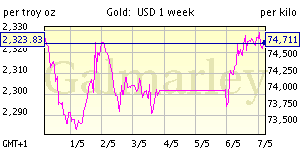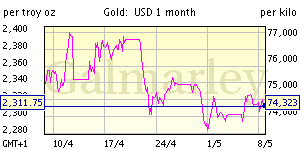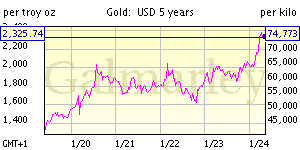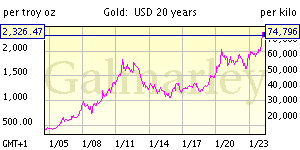As the following article points out, banks and insurance companies are no better than the investments they make, and at present they are ALL insolvent. Should the general public every discover this fact, the insuing run would instantly bankrupt the system.
What does that mean in practical terms?
You lose everything in your FDIC Insured bank account, mutual funds, bonds, cash, futures and insurance company annuities and policy cash values.
Of course the only alternative to storing one's wealth in paper assets is gold, silver and/or platinum. As the following article points out, those who have it could reap a thousand percent return overnight in the event of a public panic, leaving them one of the few survivors in a systemic meltdown as almost happened last September. (Watch video of Congressman Kanjorski's candid testimony of how close we came to a banking system collapse last year.)
The following article shows how the current gold shortage could be the breach that breaks open the dam and starts the tidal wave of paper money defaults.

Potential COMEX Gold Fail
June 19, 2009 by Trace Mayer
FUTURES AND FORWARD CONTRACTS
Many commodities trade via forward or futures contracts. A forward contract is is an agreement between two parties to buy or sell an asset at a specified point of time in the future. A futures contract is a standardized contract to buy or sell a specified commodity of standardized quality at a certain date in the future, at a market determined price (the futures price).
REGULATION AND COUNTER-PARTY RISK
Both futures and forward contracts introduce counter-party risk which depends on the financial ability of the counter-party to perform and may result in a failure to deliver. The calculated counter-party risk of futures contracts are assumed to be lower than forward contracts because they are traded on commodity exchanges. This is because generally governments must provide a common insurance or regulatory standard, such as the Commodity Futures Trading Commission (CFTC), and some release of liability, or at least a backing of the insurers, before a commodity market can begin trading.
COMMODITY MARKET SIZE
As a result of this increased confidence the size of futures contracts has grown tremendously. The major commodities exchanges in the United States were the COMEX and NYMEX which merged under the New York Mercantile Exchange and Commodity Exchange, Inc. (NYMEX) name on 3 August 1994.
The notional value outstanding of OTC commodity derivatives contracts increased 27% in 2007 to $9.0 trillion. OTC trading accounts for the majority of trading in gold and silver. Overall, precious metals accounted for 8% of OTC commodities derivatives trading in 2007, down from their 55% share a decade earlier as trading in energy derivatives rose.
BACKWARDATION
Because of the large aboveground stockpiles of the monetary metals threfore gold and silver should never enter backwardation. Backwardation would be evidence of the market’s increased apprehension of counter-party risk and the increased probability of a failure to deliver. The brief gold backwardation or the recent black swan of nine weeks of silver backwardation in the London Bullion Market Association (LBMA) forward markets revealed the extreme fragility of the worldwide financial and monetary system.
Mr. Avery Goodman, a securities attorney and a member of the roster of neutral arbitrators of the National Futures Association (NFA) and the Financial Industry Regulatory Authority (FINRA), has also written extensively about whether the COMEX will default on gold and silver, how the NYSE ran out of gold bars, the evidence that the ECB bailed out Deutsche Bank preventing a failure to deliver of gold on the COMEX and a follow up article on the ECB’s saving of the COMEX from a gold default.
Then there are other commentators like Jason Hommel, the creator of the satirical silver CFTC appreciation medallion above, who alleges regulatory culpability. Still others like the Gold Anti-Trust Action Committee (GATA) who has met with CFTC officials bring considerable intellectual firepower to the allegation of a central bank gold price suppression scheme where Mr. Robert Landis, a Harvard trained attorney, asserts “Any rational person who continues to dispute the existence of the rig after exposure to the evidence is either in denial or is complicit.”
TOOLS OF SPECULATION
Due to the size of the derivative contracts traded on the commodity exchanges and the counter-party risk the contracts are impregnated with therefore a bankruptcy of either the counter-party, the exchange or both could happen. Due to the increased liquidity of these exchanges many of those buying or selling the contracts for speculative purposes neither want possession of the underlying commodity nor possess the underlying commodity and have the ability to physically deliver.
While there are some some legitimate measures such as oil or gold companies that sell forward their production, and the number of gold companies has increasingly withered, in many cases when you buy these gold derivatives you are buying from a speculator who is shorting gold and that gold speculator does not actually own any physical gold.
MECHANICS OF AN EXCHANGE BANKRUPTCY
Let us assume for the sake of argument that gold prices go ballistic and you decide you want your gold by taking delivery on the contract. What if gold prices go up dramatically in one day such as a thousand dollars an ounce. Is it possible? Of course. Is it probable? Not really.
But that means the person who shorted gold is in a very precarious position and could have possibly lost everything or more. Perhaps they had a stop but the market is fast and gaps and as a result they cannot get out of their position. What would happen?
Let us assume this speculator had ten thousand dollars in their commodities account and they were short a gold contract. Suddenly, perhaps overnight, the Chinese press the issue because the International Monetary Fund failed to deliver on their gold sales and needed a line of credit, gold prices rapidly jumped and this speculator lost a hundred thousand dollars overnight. Now the brokerage firm has to attempt to collect on this ninety thousand dollar margin call in the form of an unsecured debt. What if they cannot collect and what if there are hundreds or thousands of speculators in similar situations?
With this failure to deliver and violation of margin requirements what if the exchange, because they do not have adequate capital or liquidity, cannot get the currency to settle the contracts? Then the exchange goes broke unless there is a government bail out but what good would that fiat currency do in purchasing the physical gold or silver bullion?
COUNTER-PARTY RISK MATERIALIZING
This is what happened with the American Insurance Group. The reason AIG went bankrupt is because they were the other side of many speculative contracts. When the flock of black swans they had insured against descended AIG could not perform because they did not have the cash. The government bailed them out at the cost of hundreds of billions if not trillions of dollars.
This means if you buy silver or gold on the COMEX via futures contracts, there is a huge move up, the COMEX goes bankrupt and the government does not bail them out then you are not going to be able to cash out your epic gains from the casino. Like the auto maker’s bond holders you will not realize and enjoy the profits you thought you would.
This is precisely what happened with people who were short a bunch of oranges and other interesting things via hedges with Lehman Brothers and even though they ‘made’ millions of dollars on their positions they lost everything. Why? Because Lehman Brothers went under and did not perform on the contracts. This is counter-party risk.
CONCLUSION
At all time and in all circumstances gold and silver remain money. For the conservative investor the reason to own them is as insurance for when everything else fails. These issues of counter-party risk are important when considering how to buy gold or silver through third parties. There are third-parties, like GoldMoney, that not subject to counter-party risk because of the way ownership is titled and the ability to demand physical delivery at any time.
As I explain in my book The Great Credit Contraction capital is burrowing down the pyramid into safer and more liquid assets. The safest and most liquid of them all are gold and silver. Why? Because the world reserve currency the FRN$ is merely an illusion that can become worthless while gold and silver are money and will always buy something.
Consequently, the conservative investor will determine what their gold standard is considering there are 140 ounces of paper gold for every ounce of physical gold. Then they will take appropriate actions, such as buying gold in a vending machine, to remove the layers of risk between them and their purchasing power in an effort to preserve and safeguard their capital.
CLICK IMAGE TO ENLARGE

![[Most Recent Quotes from www.kitco.com]](http://www.kitconet.com/images/quotes_7a.gif)






